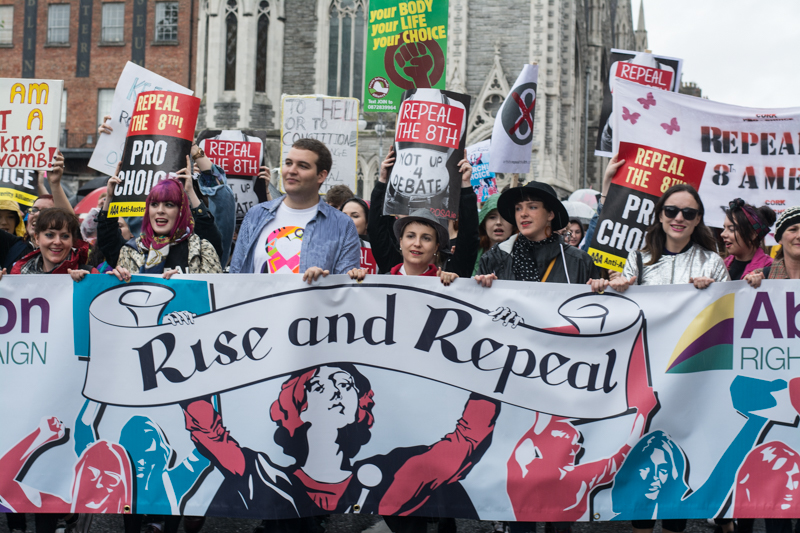Last week, William Binchy – a long-time anti-choice campaigner in Ireland – affirmed his view that the eighth amendment had “done its job”, so to speak. And it has. It was introduced into the constitution in 1983 to make sure that abortion could never be legalised in Ireland. As a result, pregnant persons in Ireland cannot access a lawful abortion unless they are likely to die without one. This makes ours one of the most restrictive abortion law regimes in the world.
This makes ours one of the most restrictive abortion law regimes in the world.
There is now unquestioned momentum around trying to address this, although there is major disagreement about ‘how far’ things should go. People are arguing already about whether abortion should be available without having to give reasons, even in very early pregnancy, or what gestational time limits should be placed on abortion where the pregnant person’s health is at risk. However, in focusing on these questions of how the law might actually be designed, we are getting ahead of ourselves. Firstly, we have to think about how we are going to change the constitution, and why we need to change it.
Everyone, including people who are morally or ethically opposed to abortion, should support repeal of the eighth amendment.
This provision very simply does harm to pregnant people every day in Ireland. It is about much more than abortion. It is part of a socio-legal tapestry that underpins medical and legal practices, through which women in pregnancy experience frequent and serious indignities. The usual rule that one cannot administer any medical treatment without the informed consent of the patient is disregarded. This is not an exaggeration. It is acknowledged in the HSE’s National Consent Policy, and part of the everyday accounts of pregnancy in Ireland. Ask your sisters, wives, friends, cousins, girlfriends who have had children: did you feel your body was respected during your pregnancy? Were you cajoled into a certain course of treatment “for the sake of baby”? Do you feel like anything happened to you without your consent? What you hear will likely surprise you. It should shock you.
This provision very simply does harm to pregnant people every day in Ireland. It is about much more than abortion.
Repealing the eighth amendment is one important part of re-orienting maternal medical care in Ireland, making pregnancy a healthier, happier and more respectful experience, and of helping women to regain control over their reproductive lives. If you support that, then you support repeal of the eighth amendment.
That doesn’t mean that repeal is not about abortion. It is. The simple truth is that for as long as thousands of pregnant people cannot access required health care in their own state, that state is failing to fulfill a basic obligation to meet the needs of its people. The eighth amendment has not stopped abortion. It has made it harder, more expensive, less accessible to people with limited resources. It has made accessing reproductive healthcare a source of shame and stigma. It has been punishing women for making considered, ethical decisions about their reproductive lives for 34 years. It has also enabled politicians to wash their hands of women’s reproductive autonomy for decades. The Oireachtas could not liberalise abortion law in any significant way even if it wanted to – the constitution simply doesn’t allow it.
That is why constitutional change matters. Repeal of the eighth amendment will not legalise abortion overnight. It will simply make it possible for politicians to do their jobs: to address complex policy areas, to listen to evidence, to design legislation and to enact it. Constitutional change is about ensuring that the Oireachtas has the power to legislate for abortion care. How it exercises that power will then be up to the Oireachtas.
In other words, repeal will simply put abortion back into the realm of ordinary politics. Right now, the constitution makes that impossible. Because of the eighth amendment, abortion is treated as if it were a uniquely difficult issue for politics to deal with. But it isn’t. Certainly, it is something on which people have deeply-held views. It is something that raises complex questions of regulation. It is something that people disagree on. But lots of things fall into those categories. This month, for example, the Oireachtas will make budget decisions that will literally have life and death impacts: welfare provisions, housing, control of tobacco and alcohol, capital investment, hospital provision and capital investment. These all involve making difficult, complex decisions, with deeply important moral implications.
In other words, repeal will simply put abortion back into the realm of ordinary politics. Right now, the constitution makes that impossible.
Abortion is complicated, but it is not uniquely so. Repeal of the eighth amendment will force politicians to stop treating it as it is, and to make a decision about how, and at what stage of pregnancy, abortion care should be available to women who need it. In other words, it will force them to do their jobs, and finally to meet the needs of women of reproductive age in Ireland.
Fiona de Londras is an Irish academic and the Professor of Global Legal Studies at the University of Birmingham, UK.








